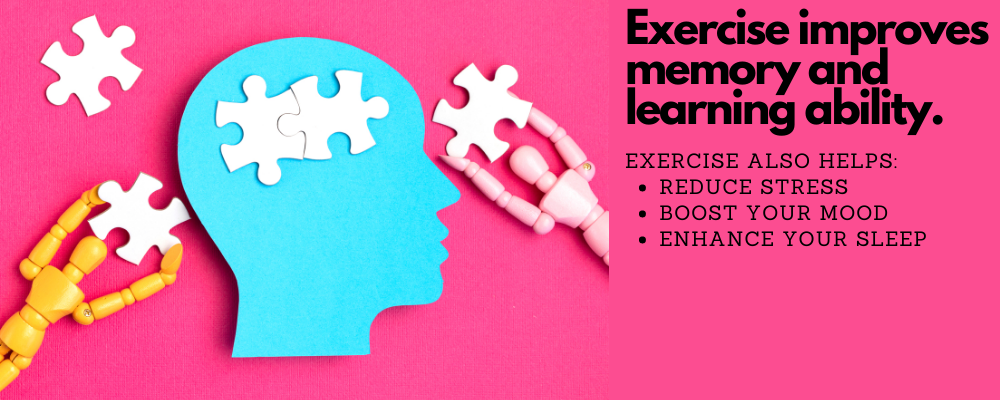Exercise and the brain: what’s the correlation? I know when I exercise, it’s a major stress relief. And when talking to people at my local gym, everyone seems to agree that exercise is a better way to release stress than even marijuana.
But why?
Exercise Boosts Dopamine and Serotonin
Depression is an epidemic, and chances are you know someone with depression. Everyone gets depressed once in a while – life is difficult and unpredictable.
The World Health Organization (WHO) claims that 300 million people worldwide suffer from depression. You’re not alone if you’re depressed. I know there are some days, for no apparent reason, I just wish I didn’t wake up in the morning.
My theory has always been that lack of moving plays a role in depression.
A lot of people don’t feel like they have a purpose. A lot of people are also stuck behind a desk all day, and it’s easier to pull up to a drive-thru than it is to get out of the car and sit down for dinner after a long day of work.
Yet regular exercise tends to relieve many people from the depression that they’re suffering from.
Why?
Research has shown that physical activity, whether it be yoga, weight training or even a brisk walk around the block, helps the brain produce:
- Dopamine
- Serotonin
Both of these brain chemicals are responsible for keeping you happy. Endorphins, the feel-good chemicals produced by the brain, are also produced.
Anxiety and depression can be helped with a bit of exercise.
Exercise and the brain are intrinsically tied based on these facts. If you want to improve brain health, start with a regular exercise routine.

Exercise Improves Memory and Learning Ability
Studies, one in particular from the University of British Columbia, found that aerobic exercise is able to enhance the hippocampus.
But why does this matter?
The hippocampus is the area of the brain that is responsible for:
- Verbal memory
- Learning
One thing to note is that researchers only experienced these results with aerobic exercise. Participants in the study that did the following did not have the same results:
- Muscle toning exercises
- Balance training
- Resistance training
I guess all those times that I have weight trained and walked by the cardio machines on the way out of the gym are now a big regret. Plus, it’s important to focus on your cardiovascular health, too.
The effects of exercise was shown to help direct and indirect memory and thinking ability.
Your brain suffers from inflammation and a lot is going on all at once. Insulin levels are fluctuating, hormones and chemicals are being produced.
Exercise directly impacts the brain by:
- Stimulating new blood vessel growth
- Reducing inflammation in the brain
- Reducing insulin resistance
These are all direct benefits to the brain, but there are also indirect positive effects that are experienced. The benefits of exercise also:
- Reduce stress
- Boost your mood
- Enhance your sleep
When you sleep, the brain has time to rid itself of toxins and start repairing the body. Stress, mood and sleep play an integral role in your cognition. If you have problems in any of these three areas, they will contribute to cognitive impairment.
Dr. Scott McGinnis of Harvard Medical School, claims that many studies found that the prefrontal cortex has a larger volume in people that exercise. The prefrontal cortex is responsible for memory and your ability to think.
I figured, after reading this study, that it would take years for any part of my brain to actually change.
I was wrong.
Moderate exercise, over a six-month period or year, can increase the volume of select areas of the brain. Cognitive abilities improve, and the benefits of exercise seem rapid.
Participants in the study walked for 120 minutes a week – that’s it. Will HIIT and other aerobic exercises produce the same results? Chances are that they will.
Update: New Study Links Irisin and Cognitive Function Together
Since first publishing this article, there has been a very interesting study done on exercise and the brain. The study was conducted b Nature Metabolism in 2021. The study was done on mice and found that following exercise, there was a notable increase in the irisin hormone.
Irisin was found to enter the brain post-exercise and improve cognition.
Additionally, the hormone is also known as an anti-inflammatory and protects against neuroinflammation.
Exercise and the Brain: Does Exercise Heal the Brain?
If you have severe brain damage, your memory function and cognitive abilities may be impaired. “Healing” may be promoted with physical exercise, but you’re not likely to reduce any extensive brain damage.
But the brain will benefit from an increase in blood flow and reduction in oxidative stress.
Researchers have studied the positive benefits of exercise on the recovery of traumatic brain injury (TBI). A 2012 study found that aerobic exercise was able to help relieve depression among TBI sufferers. The study included:
- Participants that were injured 11 months or longer prior to the study
- 12-week of aerobic exercise program
After the human studies, all participants suffered from lower levels of depression, noted higher self-esteem and also improved their aerobic capacity. No adverse side effects were reported.
But what about someone that has a TBI or a serious concussion? Can the brain heal from exercise? The truth is that there’s simply not enough studies to rely on that are not bias or seriously lacking. Further studies need to be conducted to see if there’s a link between exercise and healing improvements for TBIs or concussions.
What About Resistance Training? It Must Do Something!

I hate cardio. I would much rather do resistance training, but for the betterment of my brain, I will start doing more aerobic exercise after writing this article.
Thankfully, exercise and the brain can also include resistance training. resistance training has been shown to also benefit the brain.
The British Journal of Sports Medicine looked at 39 different studies and found that resistance training can:
- Enhance executive memory
- Enhance executive function
What is Executive Memory and Function?
Executive memory and function are very important, but a lot of people have no idea what this means. Executive function allows you to:
- Plan for the future
- Perform complex tasks
- Organize information
- Think in an abstract manner
- Store working memory
Studies show that in people aged 55 or older, exercise increases the person’s ability to perform well on cognitive tests by 400%. Substantial benefits were exhibited in as little as four weeks with exercise sessions lasting 30 – 45 minutes.
Interestingly, one study also found that taking steps when walking send waves through the body into the arteries. When this happens, blood flow increases to the brain. Increased blood flow into the brain results in more nutrients and oxygen to the brain.
Enhanced blood flow to the brain can also create new blood cells and there’s also the brain-derived neurotrophic factor (BDNF), which helps protect and repair brain cells from degeneration.
Exercise and the effects on brain health show a direct correlation to improved cognitive skills, lower stress hormones and a plethora of mental health benefits.
Getting Started With Exercise If You Have Mental Health Issues
If you’re depressed, anxious or suffering from mental health issues, it can be hard to even think about exercising. People that don’t have any mental health concerns struggle to get out of bed or off the couch and exercise.
A lot of people, myself included, always find ways to be “too busy” to exercise when in reality I could fit in a 30 – 40+ minute workout every day.
If you find yourself struggling to get started with an exercise program, these few tips can help you get going:
- Start slowly. You may want to lose weight, build muscle or reach another fitness goal, but you should be starting slowly. It’s not uncommon to want to lose 10 pounds in 30 days, lose 2 in 20 and give up. Instead, start slowly with realistic goals. Aim to exercise three days a week, and once you hit this goal, slowly move up to four days and five days a week.
- Find something you enjoy. The reason that there are always new workout fads is because people get bored easily. For me, nothing is worse than staring at the wall while on the treadmill. I despise it. But, a way around this is to find something you enjoy doing and do it. Lift weights, rock climb, do yoga, join a martial arts class – find some form of exercise you enjoy and stick to it.
- Schedule in your exercise sessions. What time is best for you to exercise? Schedule it into your day. If you find yourself missing session after session, reverse course and exercise first thing in the morning so that you start the day off doing something good for your mental health.
- Make it social. Personally, I don’t have workout partners because if they become unmotivated, so do I. Instead, be social in the gym or at your class so that you look forward to going to the gym and seeing someone that you know. If you’re hiking or doing a solo activity, you can obviously skip this point.
If you’re able to make it a week engaging in exercise, you can make it two and three and eventually you’ll feel like something is missing if you skip a session.
Exercise and the brain are linked, but so are your brain and your diet. You should try eating foods proven to protect your brain. Food plays a major role in everything from promoting cognitive functions to lowering your risk of neurodegenerative diseases
Make exercise fun. You don’t need a gym or a membership to reap the rewards of exercise on your brain. All you need to do is get moving to experience the benefits of exercise on the brain.

